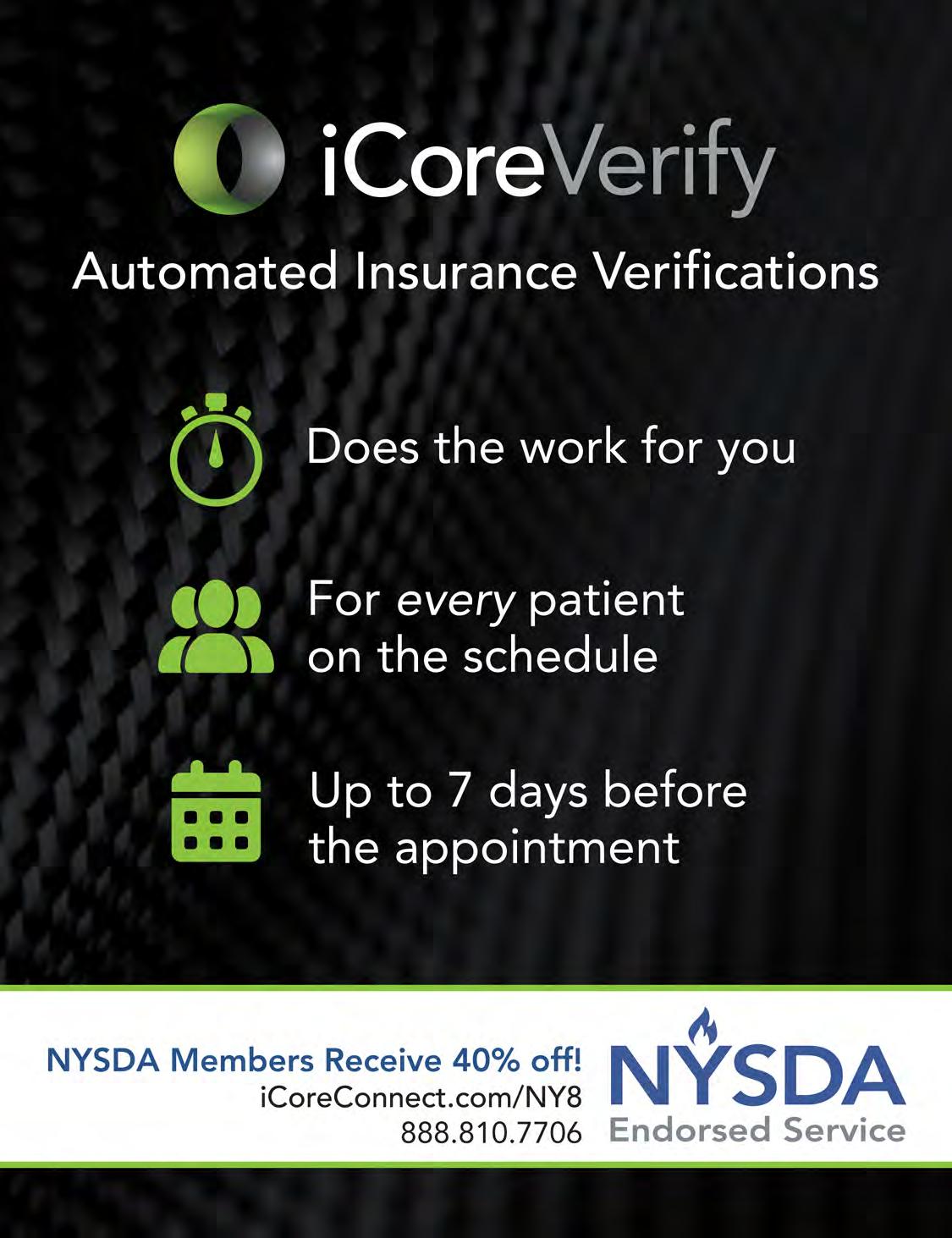
7 minute read
Editorial
Dentistry Must Continue to ‘Get It’ or ‘Lose It’
Participants in all aspects of the dental profession must understand our unique roles to succeed as leaders in our joint mission to meet society’s oral health needs.
He or she “gets it.” As dental practice owners, we often bestow this compliment upon an outstanding team member. “Getting it” connotes that this employee understands why their position exists, their unique role in the bigger picture, to whom and for what they are accountable, and the consequences of their failure to perform. The inability or unwillingness of a staff member to appreciate these realities reduces their effectiveness and could cost them their job.
Practicing dentists, along with clinical and administrative staff, dental educators and school administrators, dental researchers and journalists, and organized dentistry members all face the same expectation to “get it” and keep serving our country’s oral health needs or lose our professional autonomy and leadership authority.
Dental Practice Team
Practicing dentists and staff who “get it” understand that we exist to serve our patients and community. We help human beings manage their own oral health as part of their general health and within the framework of their individual life circumstances. We firmly avoid the self-serving concept that patients exist primarily as profit centers to serve our business plan. Our staff appreciates that although the practice owner signs their paycheck, our patients, through their decisions to continue care with our office, indirectly pay staff salaries. Together, we pledge to unequivocally place patients’ best interests above our own.
Dentists stand accountable to deliver standard-of-care treatment to patients regardless of third-party payer cost-control tactics or business overhead financial demands. We fully recognize that the consequences of our failure to meet the standard of care impair not only the oral health but, potentially, the general health and personal lives of those we serve. Hence, we educate our patients as to what dentistry can do for them, make ourselves available to do it and ensure it is done right.
The increased commercialization and corporate control of dental practice often produces practitioners and team members who do not “get it.” Although the business principles that dental service organizations apply can effectively serve patients, too often abuses of this model elevate corporate interests above patients’ best interests. As society observes that many dentists no longer “get it,” government will increasingly regulate dental practice more as a commercial entity and we will gradually lose our privilege to self-regulation and autonomous decision-making authority.
Dental Educators and Administrators
“Getting it” for dental school faculty requires that they focus on teaching students the principles and skills necessary to graduate practicing dentists who “get it.” Educators must prioritize teaching over research, administrative tasks and career enhancement. Faculty must present unbiased scientific truths free from conflicts of interest with funding sources, manufacturers, suppliers and other faculty or researchers.
School administrators exist primarily to enable faculty to teach and students to learn. They must develop fair admission policies that educate applicants on the challenges of a career in dentistry. Importantly, they must control operating costs, tuition and student debt through decreased spending on nonteaching expenses. Concomitantly, students who “get it” appreciate that it is a privilege, not a right, to prepare and serve as a dentist and, as a result, respect and dedicate themselves to the learning process and patient service.
Dental school tuition increases unrelated to teaching effectiveness, soaring dental student debt, and manufacturers’ and vendors’ biased influence on school curricula expose faculty and administrators who do not “get it.” These destructive conditions impair schools’ ability to graduate students who “get it.” After all, if students discover that their school operates more as a proprietary institution for the benefit of its employees and corporate investors, prioritizing the school over the student and profit over education, graduates will less likely embrace their expected role of placing patients’ interests above their own. Schools that do not “get it” will soon resemble trade schools and lose their professional status.
Dental Researchers and Journalists
Dental researchers and journalists exist to search for and report the truth. Researchers and journalists that “get it” ensure that our dental literature provides evidence-based, unbiased expert information and engages in open scientific debate with dissenting opinions to determine the credibility of oral health information. They remain accountable to educators, practicing dentists and patients to provide the information they need to make informed decisions.
Researchers and journalists who do not “get it” treat scientific research and its reporting as a marketable product sold for profit. They place their own financial interests above their professional and public service duties to search and report the truth. The consequences of this failure include weakened and misleading dental literature with a distorted evidence base.
Dentists’ reliance upon potentially incomplete or incorrect data can lead to clinical errors and substandard care. It can also compromise the information dentists present to patients, placing the practitioner in the position of providing “misinformed consent” or consent based upon misinformation. Dental researchers and journalists will lose their status as the source of oral health information if they fail to “get it.”
Organized Dentistry Members
Organized dentistry members “get it” when we embrace our role to elevate the public’s best interests above dentists’ collective interests as a profession. We recognize the dental profession can only continue to enjoy our privileges of selfregulation and professional autonomy if we collectively deliver affordable quality care to all Americans.
Organized dentistry members who do not “get it” view our tripartite association as a mere trade union that acts primarily on our own behalf to provide cost-saving benefits and services, and political advocacy. Nonmember dentists make no formal commitment to any collective professional responsibility or duty to self-regulate and take “not getting it” to the next level.
As a consequence, if our profession fails to meet society’s oral health needs, state governments will expand midlevel providers who can legally perform procedures previously limited to licensed dentists, allow nondentist practice ownership, and aspects of “do-it-yourself dentistry” in an effort to provide the access to care that the dental profession did not provide.
Patients’ and Society’s Role
Dentistry can “get it,” but will only succeed in delivering affordable, quality oral healthcare to all if our patients and our policy and lawmakers also “get it” and strive for the same goal. Patients must accept that no third party can bestow oral health upon them. Individuals must invest the time, money, hard work and the associated discomfort it takes to attain any goal and make oral health a priority. Our government must act to protect its citizens through necessary legislation. However, when lawmakers over-regulate and attempt to micromanage, they stand in the way of the dental experts their laws created to meet our oral health needs in the first place. For now, all components of the dental profession must control what we can and continue to “get it.”

REFERENCES
1. Gary C. The Truth About the Truth. N Y State Dent J. 2022 June/July;88(4):2-4.
2. Gary C. Fake News in Dentistry: Misinformed Consent. N Y State Dent J. 2017 Mar;83(2):2-3.
EDITORIAL POSITION
THE NEW YORK STATE DENTAL JOURNAL is inviting applications from members of the New York State Dental Association interested in filling the position of Journal Associate Editor. The position is for one year, commencing January 2024. At the end of the year, the Associate Editor is expected to begin a two-year term as Editor, with the possibility of that term being extended by another three years.
The Associate Editor will be asked to assist the Editor in performing the following duties:
• Contribute relevant and cogent editorials.
• Solicit manuscripts from prospective authors/researchers.
• Find appropriate manuscript reviewers and manage the peer review process.
• Review manuscripts for clarity and accuracy and make final editorial decisions about manuscripts.
• Act as an ambassador for The Journal, with a vision to advance its standing and increase its impact.
Candidates for this position must possess and demonstrate the following skills:
• Strong writer.
• Organized; able to meet deadlines.
• Open to new concepts and methodologies.
• Understand or be willing to learn digital publishing and platforms, such as Digital Commons and Google Scholar.
Interested candidates are asked to email a letter of introduction, CV and writing samples to the Managing Editor by September 30. Address submissions to Ms. Mary Stoll mstoll@nysdental.org.











